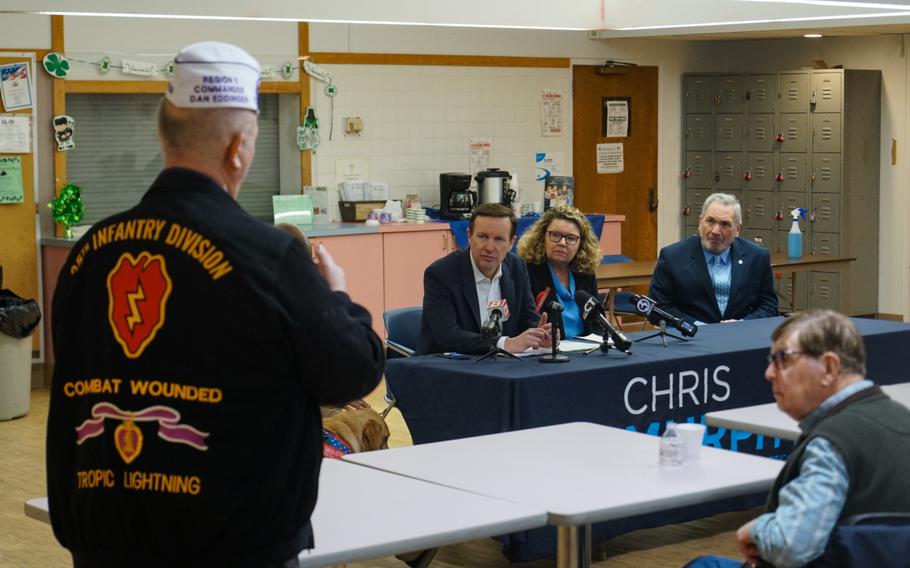
Connecticut veterans on Friday raised questions and their concerns about the PACT Act, health care services and eligibility, and veteran homelessness with Sen. Chris Murphy, D-Conn., at the New London Veterans’ Coffeehouse. (Facebook)
NEW LONDON (Tribune News Service) — Connecticut veterans on Friday raised questions and their concerns about the PACT Act, health care services and eligibility, and veteran homelessness with Sen. Chris Murphy, D-Conn., at the New London Veterans’ Coffeehouse.
The purpose of the visit was for Murphy, who sits on the Appropriations and Health, Education, Labor & Pensions committees, to listen to veterans about their concerns.
He opened by speaking briefly about the PACT Act, intended to improve health care access for veterans exposed to toxic substances during their service and provide disability benefits to veterans exposed to burn pits, whose claims have largely been denied.
The law added more than 20 presumptive conditions ― meaning it’s automatically assumed that one’s military service caused a condition ― for burn pits, Agent Orange and other exposures. The bill, which Congress passed last year with bipartisan support, is expected to cost $300 billion over the next 10 years, but Murphy said “it was the right thing to do, and we did it.”
“We all served. We all went over ― 18, 19, we’re in perfect health. We come back and only Jesus knows what’s wrong with us,” said Dante Grassi, a disabled veteran who serves as chaplain for the Veterans’ Coffeehouse in Willimantic and runs the nonprofit group No Warrior Forgotten Inc.
He and another veteran talked about housing and homelessness, and Sen. Martha Marx, D-New London, shared a story of one of her patients ― she’s a nurse ― who was on oxygen, had chronic obstructive pulmonary disease, and was in and out of the hospital, but had to live in a hotel for a year.
Murphy talked about helping increase the number of Department of Housing and Urban Development vouchers for veterans since he got elected.
Another topic that came up was transportation access.
Murphy said there’s not enough health care services in eastern Connecticut and in a high-cost state, “we can’t assume everybody has a car,” so he welcomed ideas on how to provide more transportation options.
“It’s just not realistic to expect every veteran in southeastern Connecticut to huff it over to West Haven to get mental health services,” Murphy said.
Niantic resident Bob Guenther, who served five years in the Air Force in the 1960s, touched on this issue in talking about services available at the Department of Veterans Affairs outpatient clinic in Shaws Cove. He thinks the clinic, which tripled its size when it moved to its current space, may be understaffed.
Guenther goes there for primary care and said he has walked by offices that say audiology and dermatology, but there is no staff there. He suggested that community-based dentists, for example, who aren’t VA employees could work there and provide services.
Guenther says veterans needing other services beyond primary care get referred to Newington or West Haven, and while he doesn’t worry about traveling, he knows other people do.
Murphy noted that Congress a few years ago passed the MISSION Act, which allowed veterans to get more health care services outside the VA, but “we’ve had some issues implementing that.”
Dan Eddinger, Region 1 commander for the Military Order of the Purple Heart, said one issue he has heard about repeatedly is that veterans whose disabilities weren’t incurred or worsened by military service aren’t eligible for home care benefits.
Rep. Anthony Nolan, D-New London, brought up a bill the legislature’s Veterans’ and Military Affairs Committee drafted that would establish a personal income tax deduction for veterans’ home care costs. The committee held a public hearing on the bill this week.
Nolan and Marx co-chair the committee, and Murphy noted how fortunate southeastern Connecticut is to have that level of representation.
(c)2023 The Day (New London, Conn.)
Visit The Day (New London, Conn.) at www.theday.com
Distributed by Tribune Content Agency, LLC.